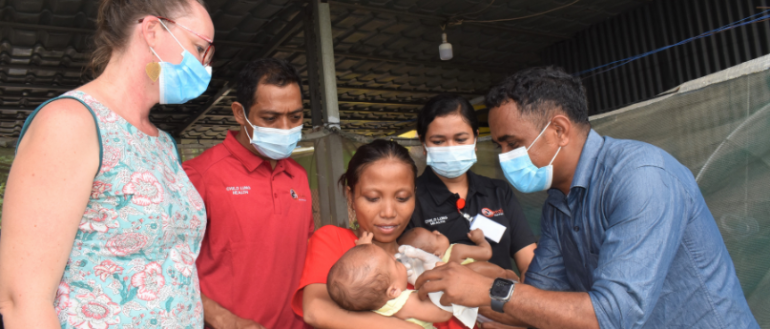A multi-centre double-blind randomised controlled trial (RCT) to reduce recurrent respiratory-related acute lower respiratory infections in young Indigenous children using long-term, once-weekly azithromycin (PETAL Study)
Funder:
- National Health and Medical Research Council
Collaborators:
- Menzies School of Health Research, Darwin, Australia
- Griffith University, Gold Coast, Australia
- University of Auckland, Auckland, New Zealand
- The University of Queensland, Brisbane, Australia
- Starship Children’s Hospital, Auckland, New Zealand
- Northern Territory Government, Darwin, Northern Territory
- KidzFirst Hospital, Auckland, New Zealand
- Guido Valadares National Hospital, Dili, Timor-Leste
Aims:
Primary aim:
- To determine whether 12-months of weekly azithromycin (compared to placebo) improves clinical outcomes of Indigenous children (aged <2-years) hospitalised with an acute lower respiratory infections (ALRI)?
Secondary aims:
To determine the effect of 12-months of weekly azithromycin (compared to placebo) on:
i) Rates of ALRI-hospitalisations in 12 months
ii) Chronic respiratory symptoms/signs of bronchiectasis (at 24-months)
iii) Serious adverse events (at 12-months)
iv) Antimicrobial resistance in the upper airway respiratory bacteria
v) The upper airway microbiota and gut microbiota
vi) Cost-effectiveness.
Summary:
Acute lower respiratory infections (ALRI) remain a leading cause of recurrent hospitalisation, particularly among young Indigenous children from Australia and New Zealand.
Early and repeated ALRI in young children increase the risk for poor future lung outcomes, such as impaired lung function and chronic lung diseases (i.e. bronchiectasis and non-smoking related chronic obstructive pulmonary disease) which are highly prevalent among Indigenous populations. There is a need to reduce the high burden of recurrent ALRI and its future consequences on lung health. A small body of evidence has shown that early and intermittent azithromycin treatment improves respiratory outcomes, but this has not been tested in an at-risk population such as Indigenous children.
Implications for policy and practice:
This trial will assess the efficacy, safety, and microbiological and economic impacts of azithromycin in children at high-risk of recurrent ALRI and future bronchiectasis which will inform national and international clinical guidelines.
Chief investigator:
Project managers and contact details:
- Ruth Outridge (Darwin): Ruth.Outridge@menzies.edu.au
- Emily Bowden (Dili): Emily.bowden@menzies.eu.au
- Adriano Vieira (Project co-ordinator for Dili): Adriano.vieira@menzies.edu.au
Project dates:
The project commenced in 2019 and is due to be completed in 2024.

